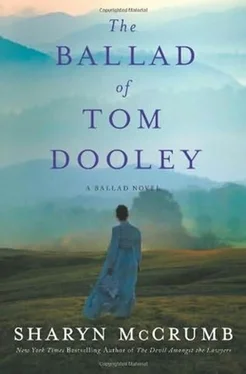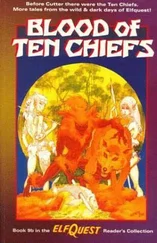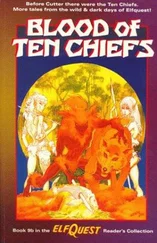When we got to the spine of the ridge, well past the Dulas’ farm, heading toward Stony Fork Road, where the Meltons’, Lotty Foster’s, and the Bates’ place all sat within sight of one another, I signaled for the procession to stop, and, with my back to the creek, I pointed them toward the steep slope in front of us that led to the wooded crest of the ridge.
“She led me up there,” I said, stabbing with my finger upward toward the tall trees. “I waited on a fallen log, while she went and looked at the grave. But it lies up there on the ridge somewhere.”
They turned their horses toward the field, and picked their way along, studying the ground as they went, but they were well below where me and Ann went, so it weren’t no use, but I didn’t bother to say so. One of the riders stayed close to my mount as we climbed. All the way from town they had taken care that somebody stayed near me all the time, in case I took a notion to run, but I was staying put to see what happened. I sang out when we reached the dead log, and I climbed off that horse, and settled back down on it. As I watched, the men spread out, working in pairs, slipping this way and that, through the bushes and past the trees, always searching for broken branches and clabbered ground. One of the Wilkesboro men stood next to me with a pistol on his hip, watching the searchers go across the clearing and head farther up the slope, but he wasn’t interested in passing the time of day with me.
It was cool in the shade up there on the ridge, and I leaned back in a shaft of sunlight, smelling dead leaves and damp earth, and watching three gray pigeons flit about in the treetops. I could have done with a dipper of water and a hunk of bread and meat, because it had been a long time since my jailhouse breakfast, such as it was, but none of the searchers stopped to eat. I suppose that hunting for a body three months dead had put them off their feed.
They kept circling higher and higher up the ridge, going slow, and peering down at the ground as they went. Then a good ways above where I sat, I heard shouts, and the men came back out of the thickets and from the lower woods, and they all headed up at once in the direction of the yelling.
I reckoned they had found her.
Nobody bothered to tell me what was going on, but a few minutes later, someone ran back down and called out to my minder, “Mr. Horton’s horse shied like it smelled something foul, and the colonel got down and saw that new sod had been put on the ground there. We think it’s her down there. You can take the prisoner on up to the thicket to identify the remains. I’m off to fetch the doctor.”
With that, he nudged his mount, and began to pick his way around the logs and underbrush, heading down the slope toward the Reedy Branch Road. It was a good two miles from here to Cowle’s store and from the river road, two miles in the other direction to Elkville, so I judged it would be more than an hour before Dr. Carter would arrive to have his say about whatever the searchers unearthed.
I had seen dead folks before. They died often enough from want and wounds back in the War, and a time or two I had to help with the laying out, but I had never seen what was left of a corpse after three months underground. I wondered if they would be able to tell who it was if they did find anything.
When we reached the thicket where the searchers were gathered, I edged my way past a couple of men until I could see what they were doing at the grave site. Colonel Isbell and Mr. Horton had dismounted now, and they had scraped away the sod covering from the dug-out trench, and I could see that there was a cloth-covered lump lying there, not even two feet below the level of the ground: a shallow grave, indeed, but still deeper than I could picture Ann digging with her fine white hands.
The Colonel knelt beside the trench, and pointed to a mark on the side where the covering sod had been removed. “Look at that cut. The blade of a mattock made that, I’ll be bound.”
The other men looked at one another. Word had got around with the rest of the gossip that Martha Gilbert had seen Tom out skelping with a mattock near Lotty Foster’s place on the day before Laura went missing. But nobody said anything.
Then, with everybody still watching, he reached down and lifted the bundle of clothes out of the hole so that we could see what was underneath. What , not who . It didn’t look like a “who” anymore. What was left was a cloth-covered pile of skin and bones that put me in mind of a slaughtered hog-a skinny one that had run wild on the mountain and then died at the end of a harsh winter.
One of the lawmen motioned for me to come closer, and I stepped up to the very edge of the hole. “Is that Laura Foster?” he asked me.
The body was set in on its side, but faceup, and, although the hole was nearly two feet deep, it had been dug too short to accommodate even a body as small as that one. The legs were tucked up under the corpse, to make them fit. It was no proper grave. Just a place to dump a hunk of rotting meat.
I glanced around at the faces of the searchers. Some of them looked green around the gills, and the rest were ashen with anger and muttering amongst themselves. I looked back at the decaying lump of flesh that used to be my cousin. I knew her better than any of them did. But what was the use of taking on over her being dead? She was past hearing us now.
The skin on the face was mostly gone, but there was a hank of light brown hair still attached to the scalp. I knew that color. I could just see her feet, where they were tucked up behind her. She was wearing little leather shoes that I had seen James Melton making for her. They had held up better than the dress material in the damp earth.
I knew the dress, too: it was a checkered one, homemade. I had seen her cutting the cloth and stitching it. Over top of it she had put on a dark wool cape that was maybe too warm to wear on a May morning, but it was too good for her to leave behind, so she’d put it on anyhow. It was fastened around her shoulders with a pinchbeck brooch pin, the only finery she had. I wondered what would become of that with her dead.
It was her, all right.
The lips were drawn back in that skinless face, and I could get a clear look at her teeth. They were big teeth for her little face, and there was a space between the two front ones. Anybody who knew her would recognize those teeth.
“It is Laura Foster,” I said. “I’d know her by her teeth-that space in-between the front ones. And I was with her when she sewed that there dress she is wearing.”
Several of the others muttered in agreement. Most of them were acquainted with her-and it crossed my mind that some of them knew her maybe too well, though they’d never own up to that now. But even with the face mostly eaten away by the damp and the worms, we all could tell it was her.
One of the searchers said, “How did she die?” He wasn’t talking to me, though, so I didn’t answer.
“Doctor’s on his way,” the Colonel told him. “We ought not to touch the body overmuch till he can examine it.”
“You reckon she was carrying a child?”
I had to put my hand across my mouth to hide a grin. What would that have mattered-to Tom or anybody else? Why, Lotty Foster had five young’uns by as many fathers, and nobody had bothered to marry her. If Laura Foster had been the Colonel’s girl or the daughter of a lawyer or a doctor, then there’d have been a hue and cry if she fell pregnant, and the poor fellow courting her would have been hauled before the justice of the peace at the business end of a shotgun for a hasty wedding. But Laura’s good name was in the mud long before Tom Dula ever took up with her. She had no more notion of chastity than any of the other Foster women, which is to say: none at all. Were these graven fools really thinking that Tom had killed her to keep from having to marry her? Why if she had put such a notion to him, he’d have laughed in her face-or else told her to saddle that baby on one of her many other lovers.
Читать дальше












